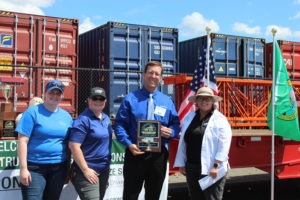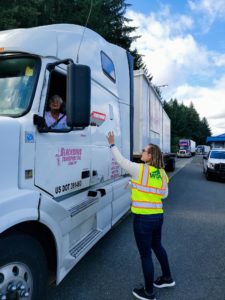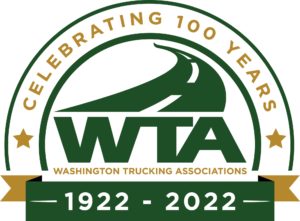Drivewyze is a proud partner of trucking-related associations across North America. We examine trucking associations and the people who lead them to learn more about the history and the latest initiatives in an ongoing blog series. Today, we’re exploring the Washington Trucking Associations, its achievements and how the association has shaped progress in the trucking industry.
Get to Know Sheri Call – Head of the Washington Trucking Associations
As a kid growing up in Logan, Utah, Sheri Call often spent time playing inside the cab of her childhood friend’s dad’s Class 8 truck. Her CB radio handle? Tic-Tac-Toe, a fun name she gave herself – without rhyme or reason — as kids do.

Sheri Call, President & CEO of Washington Trucking Associations
That was the extent of Sheri’s exposure to heavy trucks and the industry during her youth. “I didn’t grow up in a family that owned trucks or worked in the trucking industry, so I didn’t know much about trucks other than what I learned from my friend and her dad,” said Sheri. “Working in the industry was not something that had ever crossed my mind growing up.”
Years later, that would change. After graduating with a bachelor’s degree in accounting from the University of Utah in 1994, Sheri moved to Washington state to begin her career in accounting with a parts supplier for a major truck manufacturer. In 2003, she accepted a position in accounting for the Washington Trucking Associations (WTA) to advance her career growth.
Little did she know that this role would mark the beginning of what would lead to her becoming a key figure and advocate for the trucking industry in Washington as president and CEO of the WTA.
“When I joined the WTA, I really didn’t fully understand how trade associations operated, their influence on the industry, or why companies became members,” Sheri recalled. “I soon learned why associations like the WTA are so important as a unified voice and the impact it has for influencing regulations and policies for trucking companies operating in Washington.”
The Rise to President and CEO of WTA
From 2003 to 2016 Sheri learned the ‘ins and outs’ of the association. From accounting to branching out and serving in leadership roles, including vice president of member communications, and later vice president of member services. Sheri gained valuable experience working in a variety of association functions. That’s why in 2013, Larry Pursley, former WTA president and CEO tapped her to job shadow and lead the WTA following his retirement in 2016.
This year, the WTA celebrated its 100th anniversary – a significant milestone. In fact, the WTA is the oldest state trucking association west of the Mississippi. Formed in 1922, Sheri is just the 4th president and CEO of the association.
“It’s interesting to look back at the history of this organization and read about some of the problems the trucking industry was facing generations ago,” said Sheri. “We have a letter penned by our first president, Joe G. Ryan, from 1931 that discusses the importance of membership and how a strong member base helps in the association’s ability to advocate on behalf of the industry. It’s timeless. It was true then, and it’s especially true today. We rely on our members’ expertise in the field to help influence policy and regulation changes when we meet with legislators of the state.”
As the unified voice for the trucking industry in Washington, the WTA advocates for sound public policies and offers educational and training opportunities to its members. It also provides information to promote safe and efficient transportation systems. The association works closely with its board of directors and members when it comes to campaigning for or against legislation that affects the industry. The association is also proactive in introducing policy that improves operating conditions for drivers and fleets.

2022 Winner of the Washington Truck Driving Championships
The Face of the WTA
Under Sheri’s tenure as president and CEO, the WTA remains focused on working with governing agencies to bring forth legislation that promotes a safer and more efficient working environment for drivers and trucking companies. Earlier this year, the WTA played a key role in the passing of House Bill 1706, which requires marine terminal operators to provide “a sufficient number of restrooms” for use by truckers. The bill also created a system for drivers to report bathrooms that pose a health or safety risk to drivers. The WTA teamed up with the American Trucking Association and the Owner-Operator Independent Drivers Association to promote the bill which was signed into law at the end of the 2022 session.
“The WTA is really a bridge between industry and government. Our role is to help legislators better understand how our industry operates so that they can make informed decisions that impact trucking companies and drivers,” said Sheri. “HB1706 is an example of a commonsense law that needed to happen to improve operating conditions for drivers. No driver should be denied use of a bathroom while they wait to load or unload.”
Due to the COVID-19 pandemic and a shift to a more permanent “hybrid” workplace at the WTA and at the state capitol in Olympia, Washington, more meetings to discuss policy are being held virtually.
“A positive takeaway from the pandemic is that people are more flexible with where they work,” said Sheri. “This has allowed us to host meetings virtually as opposed to only in-person. This makes it much easier for our members who want to participate in policy-driven discussions but can’t make the trip to Olympia to attend.”
Member Benefits

Members of the WTA handing out luncheons to drivers during National Truck Driver Appreciation Week
While the opportunity to participate in advocacy-based decisions is a key benefit as a member of the WTA, the association’s educational and training opportunities on the latest developments on changes in the industry help trucking companies stay informed. The WTA also hosts several events throughout the year, which presents great networking opportunities for members. In addition, the WTA is currently working on developing a new technology and maintenance counsel, which will be focused on helping trucking companies adapt to new technologies and better plan for the decarbonization era of trucking that is quickly approaching.
“The trucking industry looks entirely different today compared to when this association formed in the ‘20s. And what’s on the horizon with the coming of alternative fuel vehicles (AFVs) and policies requiring the decarbonization of commercial trucks will be the biggest opportunity and challenge yet,” said Sheri. “The next 20-30 years will be a major transitional period for the industry as AFV technology advances and policies mandating trucking companies to purchase non-diesel trucks goes into effect. A lot is happening now that will reshape the way companies in our industry operate, and we’re doing what we can to help truckers prepare for it.”
At a Glance
Association: Washington Trucking Associations
Address: 2101 Carriage St SW Bldg F, Olympia, WA 98502
Contact: https://watrucking.org/contact-us/#contact
Website: https://watrucking.org/
How to join: Inquire about membership by contacting the WTA – https://watrucking.org/contact-us/
Phone: 253-838-1650
Founded: 1922
President/CEO: Sheri Call